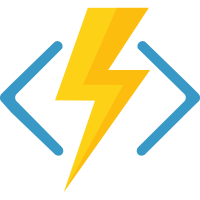| Branch | Status |
|---|---|
| main | |
| release/1.x |
Welcome to the Azure Functions .NET Worker Repository. The .NET Worker provides .NET 5 support in Azure Functions, introducing an Isolated Model, running as an out-of-process language worker that is separate from the Azure Functions runtime. This allows you to have full control over your application's dependencies as well as other new features like a middleware pipeline.
A .NET Isolated function app works differently than a .NET Core 3.1 function app. For .NET Isolated, you build an executable that imports the .NET Isolated language worker as a NuGet package. Your app includes a Program.cs that starts the worker.
.NET Isolated introduces a new binding model, slightly different from the binding model exposed in .NET Core 3 Azure Functions. More information can be found here. Please review our samples for usage information.
The Azure Functions .NET Isolated supports middleware registration, following a model similar to what exists in ASP.NET and giving you the ability to inject logic into the invocation pipeline, pre and post function executions.
You can find samples on how to use different features of the .NET Worker under samples (link).
Note: Visual Studio and Visual Studio Code support is on the way. In the meantime, please use azure-functions-core-tools or the sample projects as a starting point.
Download .NET 5.0 from here
To download Core Tools, please check out our docs at Azure Functions Core Tools
In an empty directory, run func init and select dotnet (Isolated Process).
Run func new and select any trigger (HttpTrigger is a good one to start). Fill in the function name.
Run func host start in the sample app directory.
Note: If you selected a trigger different from HttpTrigger, you may need to setup local connection strings or emulator for the trigger service.
Debugging for the Isolated model is supported in Visual Studio 2019 and 2022 with the Azure Development workloads support installed.
NOTE: To debug your Worker, you must be using the Azure Functions Core Tools version 3.0.3381 or higher. You must also have the Azure Toolkit for Rider installed.
In Rider, make sure a Run Configuration is generated for your Azure Functions project is active. You can also create a custom Run Configuration from the Run | Edit Configurations... menu.
To start debugging, select the run configuration and start debugging. This will compile your project, run the Core Tools, and attach the debugger to your project.
Under the hood, Rider launches the Core Tools with the --dotnet-isolated-debug argument, and attached to the process ID for your worker process.
You can place a breakpoint in any function, and inspect your code as it is running. Note that debugging startup code may timeout (#434).
- Powershell 7
- CosmosDb Emulator
- Azurite (the set up script will download this automatically)
- Run
setup-e2e-tests.ps1. Once the build succeeds and the emulators are started correctly, you are done with the setup. - Run
run-e2e-tests.ps1to run the tests or use the Test Explorer in VS.
Note: Do not add the switch to skip the core-tools download when running set-up-e2e-tests.ps1 as it will lead to an incomplete setup.
-
To deploy the app, first ensure that you've installed the Azure CLI.
-
Login to the CLI.
az login
-
If necessary, use
az account setto select the subscription you want to use. -
Create a resource group, Storage account, and Azure Functions app. If you would like to use an existing Windows .NET Core 3 function app, please skip this step.
az group create --name AzureFunctionsQuickstart-rg --location westeurope az storage account create --name <STORAGE_NAME> --location westeurope --resource-group AzureFunctionsQuickstart-rg --sku Standard_LRS az functionapp create --resource-group AzureFunctionsQuickstart-rg --consumption-plan-location westeurope --runtime dotnet-isolated --functions-version 3 --name <APP_NAME> --storage-account <STORAGE_NAME>
-
Ensure you are in your functions project folder.
-
Deploy the app.
func azure functionapp publish <APP_NAME>
- Optimizations are not all in place in the consumption plan and you may experience longer cold starts.
Please create issues in this repo. Thanks!
This project welcomes contributions and suggestions. Most contributions require you to agree to a Contributor License Agreement (CLA) declaring that you have the right to, and actually do, grant us the rights to use your contribution. For details, visit https://cla.opensource.microsoft.com.
When you submit a pull request, a CLA bot will automatically determine whether you need to provide a CLA and decorate the PR appropriately (e.g., status check, comment). Simply follow the instructions provided by the bot. You will only need to do this once across all repos using our CLA.
This project has adopted the Microsoft Open Source Code of Conduct. For more information see the Code of Conduct FAQ or contact [email protected] with any additional questions or comments.

